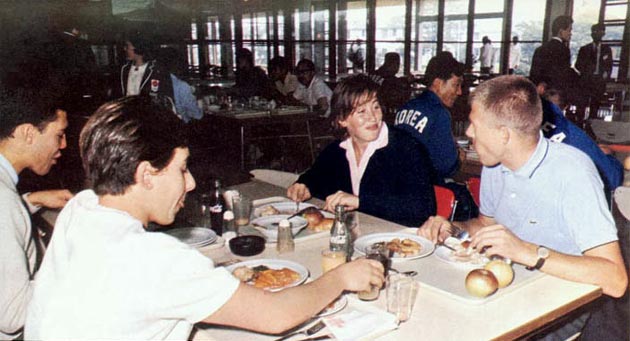The suppliers of food for the athletes at each Olympic Village face the challenge of meeting the diverse nutritional needs of the athletes while considering factors such as special dietary needs, cultural preferences, language barriers, food safety, sustainability, timing, and cost management. It requires careful planning, coordination, and flexibility to ensure that athletes have access to suitable and nourishing meals throughout the duration of the Olympic Games.
 Athletes enjoying a meal at the Olympic Village food hall
Athletes enjoying a meal at the Olympic Village food hall(image from the Olympic Games Official Report Tokyo 1964)
A Large Diverse Population
Not only do they need to feed the thousands of athletes which attend each Games, there are nearly as many coaches, officials and volunteers. These people will be from over 200 countries, each with their peculiar cultures and dietary preferences. Providing meals that accommodate various dietary restrictions, religious practices, and cultural preferences can be a large logistical challenge.
The athletes have specific nutritional requirements based on their sports, training intensity, and performance goals. The food service must cater to these specialized needs, providing a variety of nutrient-dense meals, appropriate macronutrient ratios, and suitable recovery options.
There is also the challenge of catering to the diverse languages. Athletes from around the world speak different languages, and communication can be a barrier when it comes to understanding their specific dietary needs and preferences.
Athletes Beware
The Olympic village food suppliers must be wary of maintiaing a high standard of food safety and hygiene. With a large number of athletes and staff consuming meals, proper handling, storage, and preparation of food are essential to prevent food-borne illnesses and ensure the well-being of athletes.
There is also a danger for athletes that all of this wonderful food from around the world will be a temptation for them to vary from their routines. The selection of food would be mind boggling, especially for athletes with limited food choices back home. It is a great opportunity for them to experience food from other cultures, but they need to wait until after their events before over indulging.
Sustainability and Environmental Impact
At recent Olympics, the Sustainability and environmental impact of the food service has also become important. Hosting an event as large as the Olympic Games raises concerns about sustainability and minimizing the environmental impact. The food service must consider sustainable sourcing of ingredients, minimizing food waste, and implementing eco-friendly practices throughout the entire food supply chain.
History of Olympic Games Food Provision
At the first athlete village in Paris 1924, the competitors were offered three meals a day. Dinner included soup, a main meat course and desert, with wine or beer provided at lunch and dinner.
For the 1948 Olympic Games in London, the first Olympics since the war, food shortages meant that each country was asked to bring food for its own athletes. Things have changed a lot since then, with the food supply to the athletes in the Olympic Village a huge undertaking.
Nowadays the food supplied at the Olympic Village is always of good quality. It is when the athletes stray from the village that they have to be careful about the quality of the food and the drinkability of the water. This is particularly important when in countries like Brazil 2016 or China 2008 where the food hygiene standards may not be as high as in the US or in other western countries.
With so many athletes, and with the current understanding of nutrition and medicine, there will be many athletes who require a specific diet. Not all of them will be able to be catered for, though diets such as halal, gluten free, lactose free, nut free and vegetarian (vegan) would be expected to be on the menu.
The Food Service at Specific Olympic Games
Below are links to some notes about the Olympic Village food provision from many Olympic Games, from one of the first Olympic Villages in Los Angeles in 1932, to upcoming Games in Paris in 2024.
- 2024 Paris, France
- 2022 Beijing, China
- 2020 Tokyo, Japan
- 2018 PyeongChang, South Korea
- 2016 Rio, Brazil
- 2014 Sochi, Russia
- 2012 London, England
- 2010 Vancouver, Canada
- 2008 Beijing, China
- 2004 Athens, Greece
- 2000 Sydney, Australia
- 1996 Atlanta, USA
- 1976 Montreal, Canada
- 1968 Mexico City, Mexico
- 1964 Tokyo, Japan
- 1960 Rome, Italy
- 1952 Helsinki, Finland
- 1936 Berlin, Germany
- 1932 Los Angeles USA
See also some notes about the food service at the Commonwealth Games.
Resources
- Pelly FE, O'Connor HT, Denyer GS, Caterson ID. Evolution of food provision to athletes at the summer Olympic Games. Nutr Rev. 2011 Jun;69(6):321-32.
- Burkhart SJ, Pelly FE. Dietary Intake of Athletes Seeking Nutrition Advice at a Major International Competition. Nutrients. 2016 Oct 14;8(10):638.
- Thurecht R, Pelly F. Key Factors Influencing the Food Choices of Athletes at two Distinct Major International Competitions. Nutrients. 2020 Mar 27;12(4):924.
- Pelly FE, Burkhart SJ, Dunn P. Factors influencing food choice of athletes at international competition events. Appetite. 2018 Feb 1;121:173-178.
- Burkhart SJ, Pelly FE. Athlete use and opinion of point of choice nutrition labels at a major international competition. Appetite. 2013 Nov;70:6-13.
- Pelly, Fiona. (2012). The role of dietitians in food provision at the Olympic and Commonwealth Games: Past, present and future. Poster presentation at the International Congress of Dietetics Conference. Sydeny, September 2012.
Related Pages
- Nutrition at the Olympics
- History of Olympic Games Athlete Villages
- Tips for good nutrition while traveling
- Science and the Olympics
- History of the Olympic Games Athlete Villages
- Nutrition for Athletes at Major Events


 Current Events
Current Events